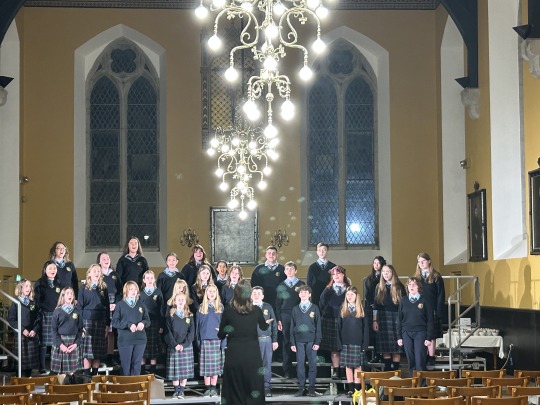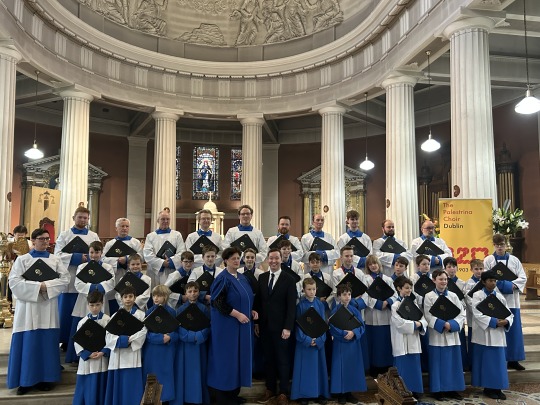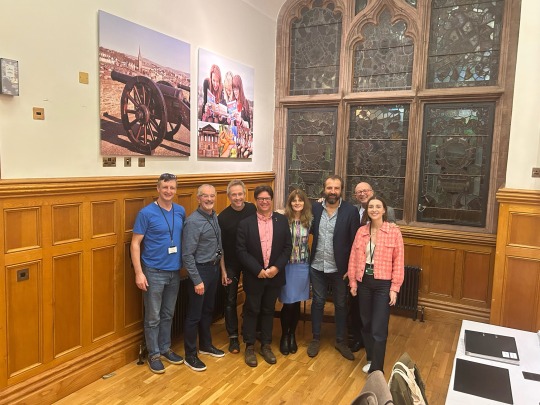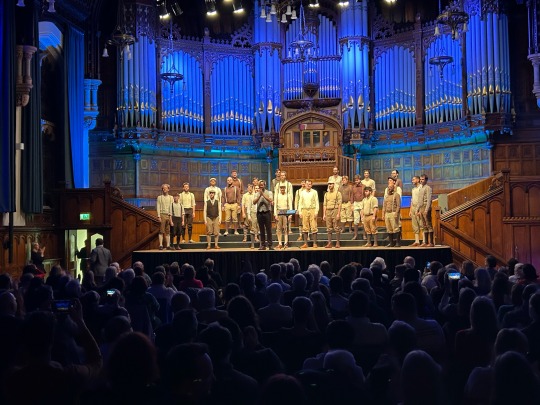Text
New Repertoire for All Ages
Now is when most choral directors are looking for their music for the next school year. While teaching at Vintage High School (Home of the Crushers – think crushing grapes) in the Napa Valley of California, I found this task daunting. Over four decades later, I found the challenge both invigorating and still daunting, especially when conducting multiple ensembles of varying ages. Later, when I…
0 notes
Text
Episode 267: Green Day
Episode 267: Green Day https://ift.tt/hmuXybD “Basket Case” LISTEN: APPLE · SPOTIFY · AMAZON· OTHER APPS Green Day is a punk band from the East Bay in California. Billie Joe Armstrong, Mike Dirnt and Tré Cool have playing music together since 1987. They’ve sold over 90 million records. They’ve won four Grammys, including twice for Best Rock Album. They put out their first album in 1990, and in 91, they put out their second album, Kerplunk!. And then they moved to a major label, and in 1994 they put out their third album, Dookie, which was huge. It helped bring punk into the mainstream. And this month is its 30th anniversary. So for this episode, I talked to Billie Joe Armstrong about the making of one of Green Day’s biggest hits of all time: “Basket Case.” Coming up, you’ll also hear from Rob Cavallo, who produced the album. Plus you’ll hear two different demo versions of “Basket Case,” the first of which is basically a totally different song. Billie Joe Amstrong traces the history of “Basket Case,” from its origins as a cassette recording in a punk basement, all the way to becoming a song that helped define an era of music. You can buy or stream “Basket Case” here. Illustration by Carlos Lerma. footnotes: Andy Ernst’s studio, Art of Ears Fantasy Studios The Muffs’ self-titled album The post Episode 267: Green Day appeared first on Song Exploder. via Song Exploder https://ift.tt/oFyTZur February 07, 2024 at 12:01PM
0 notes
Text
Episode 266: The Postal Service
Episode 266: The Postal Service https://ift.tt/a9HiIj1 “The District Sleeps Alone Tonight” Deluxe Anniversary Edition LISTEN: APPLE · SPOTIFY · AMAZON· OTHER APPS The first episode of Song Exploder, about The Postal Service song “The District Sleeps Alone Tonight,” came out 10 years ago, in January 2014. To celebrate the 10th anniversary of the podcast, we’re doing what bands do, and putting out a deluxe, expanded edition of our very first release: this version features a new interview, new insights, and new pieces of the song and demo. The Postal Service formed in 2001. Their debut album came out in 2003, and it was a game changer. Their combination of electronic music and indie rock not only sold over a million copies; their songs were everywhere on TV and in film, and influenced a generation of artists. Last year, they played sold-out concerts across the US in celebration of the 20th anniversary of the album, and there are more shows to come in 2024. A few weeks ago, I spoke to Ben Gibbard, and I combined that with my original interview from 2013 with Jimmy Tamborello. And here, together, the two of them tell the story of how they made their song “The District Sleeps Alone Tonight.” You can buy or stream “The District Sleeps Alone Tonight” here. Illustration by Carlos Lerma. footnotes: Jenny Lewis, who sings backing vocals, was the singer of Rilo Kiley Dntel – “(This is) The Dream of Evan and Chan” Jimmy’s band Arca once played with Death Cab For Cutie at Spaceland in Los Angeles Pedro Benito of Sunday’s Best and The Jealous Sound Jimmy used a Macintosh Quadra to control his Kurzweil K2000 synth Bjork – Homogenic Black Cat – Music venue in Washington, D.C. Audio-Technica 4033 – Microphone Barsuk Records The post Episode 266: The Postal Service appeared first on Song Exploder. via Song Exploder https://ift.tt/AS2antT January 24, 2024 at 12:59PM
0 notes
Text
J. S. Bach being played on the magnificent Organ at St Patrick's Chapel on the Maynooth and St. Patrick's University Campus at the close of the Lessons and Carols Service on December 12, 2023
0 notes
Text


















Irish Churches in and around Dublin. #USFulbrightScholarinIreland2023-24
0 notes
Text
US Fulbright Scholar in Ireland
What an incredible experience my Fulbright Scholar Award has been in Ireland. I was based in Balbriggan, Ireland, just outside Dublin, at the Irish Institute of Music & Song. While Balbriggan is a small town of 29,000 individuals, the Institute has much larger ambitions. With a talented and committed faculty and staff of over fifty, the multi-faceted artist-teachers teach in all disciplines,…

View On WordPress
0 notes
Text
The History of Karaoke
The History of Karaoke https://ift.tt/K2AZICR The history of karaoke is a fascinating journey that spans decades and has roots in Japan. The word “karaoke” is a combination of two Japanese words: “kara,” meaning empty, and “oke,” short for orchestra. Together, they form the concept of singing along to a pre-recorded backing track, essentially an empty orchestra waiting for vocal accompaniment. Japan The karaoke phenomenon began in Japan in the early 1970s, thanks to the innovative mind of Daisuke Inoue. Inoue, a musician and entrepreneur, invented the first karaoke machine in 1971. His invention was initially intended as entertainment for guests at a snack bar he managed in Kobe, Japan. The machine, known as the “8 Juke,” played instrumental versions of popular songs, allowing patrons to sing along using a microphone. Inoue’s creation quickly gained popularity, and he realized the potential for a new form of entertainment. 1972 In 1972, Inoue’s karaoke concept took a significant step forward when he started renting out his machines to various establishments. This began a cultural phenomenon that would eventually sweep Japan and the rest of the world. Karaoke quickly became a staple in bars, clubs, and entertainment venues, providing people a novel way to enjoy music and showcase their vocal talents. 1970s-1980s The popularity of karaoke in Japan during the 1970s and 1980s coincided with the country’s economic boom, leading to a surge in karaoke bars and the production of a vast array of karaoke music tracks. The trend gradually spread beyond Japan, reaching other parts of Asia, the United States, and Europe by the 1980s. Technology Advancements in technology fueled the global expansion of karaoke. Karaoke machines evolved from the original tape-based systems to digital formats, allowing for greater song selection and improved audio quality. Barriers Karaoke’s popularity transcended cultural and linguistic barriers, making it a universal form of entertainment. People of all ages and backgrounds embraced karaoke as a social activity, whether in private settings or at public venues. 1990s The 1990s saw the rise of home karaoke systems, enabling individuals to enjoy the experience in the comfort of their own homes. These systems often included compact discs or CD+G (CD plus graphics) formats, allowing users to read lyrics from a screen while singing along. 21st Century In the 21st Century, karaoke continues to thrive, adapting to new technologies and trends. Karaoke apps and online platforms have emerged, allowing users to access many songs from their smartphones or computers. The history of karaoke is a tale of innovation, cultural exchange, and the universal appeal of music. From its humble beginnings in a small Japanese snack bar to its global prevalence, karaoke has become a cherished form of entertainment that transcends borders and brings people together to celebrate song and camaraderie. via Jo-Michael Scheibe https://jmscheibe.com December 20, 2023 at 04:18PM
0 notes
Text
Episode 265: Foo Fighters
Episode 265: Foo Fighters https://ift.tt/xzGVX7b The Teacher LISTEN: APPLE · SPOTIFY · AMAZON· OTHER APPS For the last episode of the year, I got the chance to drive up to Northridge, California, and have a conversation with Dave Grohl. We talked about the Foo Fighters song “The Teacher,” which is an epic, 10-minute long song. Dave told me it’s the most important piece of music he’s ever written, because it’s dedicated to his mother, Virginia, who passed away in 2022. Dave Grohl started Foo Fighters in 1994, after Nirvana ended. This year, Foo Fighters set a record for having the most Top 10 hits on the Billboard Mainstream Rock charts. They’ve won 15 Grammy awards, including winning the Grammy for Best Rock album five times — more than anyone else. “The Teacher” is from their 11th album, But Here We Are, which came out in June 2023. I sat with Dave in the Foo Fighters practice space, and he told me the whole story of the song. Coming up, you’ll hear the two voice memos he originally recorded on acoustic guitar, plus the two demos he made on his way to figuring the song out. You can buy or stream “The Teacher” here. Illustration by Carlos Lerma. footnotes: Foo Fighters: Dave Grohl, Nate Mendel, Chris Shiflett, Pat Smear, Rami Jaffee, Josh Freese Greg Kurstin – Producer Taylor Hawkins The post Episode 265: Foo Fighters appeared first on Song Exploder. via Song Exploder https://ift.tt/TE7U6Nm December 20, 2023 at 03:29PM
0 notes
Text
Episode 264: Raye
Episode 264: Raye https://ift.tt/LkDFIqB Escapism (feat. 070 Shake) LISTEN: APPLE · SPOTIFY · AMAZON· OTHER APPS Raye is a singer, songwriter and producer from London. Besides being an artist in her own right, she’s also been a songwriter for other artists since she was a teenager. She’s co-written songs for Beyoncé, Charli XCX, and Ellie Goulding. In 2023, she released her debut album, My 21st Century Blues. The first single, “Escapism,” became her first song to hit #1 in the UK. It’s gone platinum in the US, the UK, and seven other countries. It features guest vocals from 070 Shake. When she was here in LA on tour, I talked to Raye about how she made “Escapism.” You can buy or stream “Escapism” here. Illustration by Carlos Lerma. footnotes: Mike Sabath – Co-writer, producer, programmer, synths, mellotron, strings arranger The post Episode 264: Raye appeared first on Song Exploder. via Song Exploder https://ift.tt/G4l2j3m December 06, 2023 at 12:54PM
0 notes
Text
How to Prepare Your Students for Recitals
How to Prepare Your Students for Recitals https://ift.tt/nCFipMB Recitals are a valuable opportunity for students to showcase their musical talent and hard work. Whether it’s a piano performance, a vocal recital, or a dance showcase, these events can be exciting and nerve-wracking for students. As an instructor or teacher, you must ensure your students are well-prepared and confident on the big day. Before diving into the specifics of recital preparation, it’s essential to understand the significance of these events. Recitals provide a platform for students to demonstrate their progress and mastery of their chosen art form. They help build confidence, stage presence, and the ability to perform under pressure. Additionally, recitals foster community among students, parents, and teachers, creating a supportive environment for artistic growth. Setting Clear Goals One of the first steps in preparing students for recitals is setting clear goals. Clearly define what you expect from each student regarding technical proficiency, musicality, and stage presence. Discuss these goals with students and parents to bring everyone on the same page. Break down goals into achievable milestones, and create a timeline to track progress. Regularly assess and provide feedback to guide your students toward meeting these goals. Structured Practice Routines To ensure your students are well-prepared for recitals, establish structured practice routines. Help them create a practice schedule that allocates time for technical exercises, repertoire, and stage presence. Encourage them to practice consistently and efficiently, focusing on improvement areas. Teach them effective techniques such as slow practice, hands-separate practice, and mental rehearsal. Emphasize the importance of repetition and muscle memory to build confidence in their performance. Rehearsals and Mock Performances Rehearsals play a crucial role in preparing students for recitals. Organize regular rehearsals where students can practice their pieces in a performance-like setting. Encourage them to treat these rehearsals as performances, including wearing appropriate attire and addressing stage etiquette. Provide constructive feedback and help them refine their interpretations. Additionally, arrange mock performances where students can showcase their pieces to a small audience of peers, friends, or family members. This will simulate the pressure of an actual recital, helping students overcome stage fright and build confidence. Preparing your students for recitals requires careful planning, clear goals, structured practice routines, and ample rehearsal opportunities. You can help your students develop the necessary skills and confidence to shine on stage by providing guidance, support, and constructive feedback. Remember to foster a positive and encouraging environment throughout the preparation process. Recitals celebrate your student’s hard work and an opportunity for artistic growth and self-expression. With thorough preparation and dedication, your students will be well-equipped to deliver memorable performances that showcase their talent and passion. via Jo-Michael Scheibe https://jmscheibe.com November 28, 2023 at 03:13PM
0 notes
Text
Episode 263: Sampha
Episode 263: Sampha https://ift.tt/nk1tG8S Spirit 2.0 LISTEN: APPLE · SPOTIFY · AMAZON· OTHER APPS Sampha is a singer, songwriter and producer from London. His first album, Process, won the Mercury Prize in 2017. He’s collaborated with artists like the XX, Kendrick Lamar, Drake, and Solange. If you saw the Song Exploder Netflix show, Sampha was in the Alicia Keys episode, for the song they did together as a duet. This year, in October 2023, Sampha put out his second album, Lahai. And for this episode, I talked to Sampha about the song “Spirit 2.0.” Coming up, you’ll hear the original demo, and some early voice memos. Sampha recruited some collaborators for the song, like producer Pablo Díaz-Reixa, aka El Guincho, who won a Grammy for his work on Rosalia’s first album; plus Yaeji; and Lisa Kaindé, from Ibeyi. But the song “Spirit 2.0” first took shape when Sampha was by himself, at home. You can buy or stream “Spirit 2.0” here. Illustration by Carlos Lerma. For a transcript of this episode, click here. footnotes: El Guincho – Co-writer, co-producer, programmer Owen Pallett – Arranger, conductor Yussef Dayes – Drums Yaeji – Additional vocals Lisa Kaindé, from Ibeyi – Additional vocals Oberheim OB-6 Moog Mother-32 Ngoni and Kora – West African instruments Wassoulou music “Sabu” by Oumou Sangaré, from her album Worotan Kodwo Eshun – Writer on Ghanaian percussion taking architectural form RAK Studios Jonathan Livingston Seagull In Conflict – Owen Pallett album featuring “The Passions” The post Episode 263: Sampha appeared first on Song Exploder. via Song Exploder https://ift.tt/4iNS2zV November 15, 2023 at 01:55PM
0 notes
Text
Episode 262: Paramore
Episode 262: Paramore https://ift.tt/wC9sjOe Liar LISTEN: APPLE · SPOTIFY · AMAZON· OTHER APPS I think one of the hardest things there is to do in music is to write a love song that expresses something real. I read that the song “Liar” by Paramore was written by Hayley Williams, the singer of the band, about her longtime bandmate Taylor York, and about the feelings she started to realize she’d had for him. Paramore has been a band for over 20 years, since Hayley and Taylor and Zac Farro, who plays drums, were all young teenagers. Paramore’s won a Grammy for Best Rock Song, and they have multiple platinum albums. But with all that history, Taylor and Hayley only recently became a couple. “Liar” is a song off of their most recent album, This Is Why, which came out in February 2023. So I talked to Hayley, Taylor and Zac in their studio about how their song first came about, and what it means to them. You can buy or stream “Liar” here. Illustration by Carlos Lerma. footnotes: Brian Robert Jones – Bass Henry Solomon – Flute, alto flute, clarinet, bass clarinet Carlos de la Garza – Engineer Blonde Redhead Cocteau Twins The post Episode 262: Paramore appeared first on Song Exploder. via Song Exploder https://ift.tt/uWZt1Or November 01, 2023 at 01:00PM
0 notes
Text
Tips for Teaching Piano to Beginners
Tips for Teaching Piano to Beginners https://ift.tt/6hFOAEB With its wide range of notes and dynamic capabilities, the piano is one of the most versatile instruments. It can evoke deep emotions, from the stirring crescendos of Beethoven’s sonatas to the gentle melodies of Debussy’s Clair de Lune. Introducing beginners to this world of musical expression is both a privilege and a responsibility. Teaching the piano effectively to novices is not just about imparting knowledge of notes and rhythms; it’s about instilling a love for music, fostering patience, and building a foundation for continuous growth. Establish a Solid Foundation Before diving into complex pieces, it’s paramount to establish a robust foundational understanding. Start with the basics of posture: how to sit at the piano, where to place the feet, and how to curve the fingers. Poor posture can lead to discomfort, reduced playing stamina, and even long-term injuries. Next, introduce the musical alphabet and the layout of the keyboard. Allow students to familiarize themselves with the unique sounds of each key. Basic rhythm exercises, even away from the piano using clapping or tapping, can help students internalize the concept of timing. Incorporate simple, well-known tunes to make learning engaging and relatable. Foster a Positive Learning Environment A positive, encouraging environment can significantly influence a beginner’s learning trajectory. Celebrate small achievements, whether mastering a challenging note sequence or successfully playing a piece without mistakes. This boosts confidence and reinforces their passion for playing. However, it’s also essential to maintain a balance. Constructive criticism is vital for growth. When pointing out areas of improvement, phrase feedback positively and provide clear steps for refinement. For instance, instead of saying, “You played that section poorly,” you might suggest, “Let’s work on this section together to make it even better.” Introduce a Variety of Music Early On While classical pieces are foundational in piano instruction, introducing a variety of genres early on can keep students engaged. Everyone has unique musical tastes, and tapping into a student’s preferences can make lessons more enjoyable. Incorporate pieces from genres like jazz, blues, pop, or even songs from movies and TV shows. This diversifies their repertoire and equips them with versatile playing techniques. Moreover, it can be a motivational tool. When students recognize and enjoy the music they’re playing, they’re more likely to practice it independently. Teaching the piano to beginners is a journey filled with highs and lows. It requires patience, adaptability, and a deep passion for music. By establishing a solid foundation, creating a nurturing learning environment, and diversifying the musical experience, you can ensure that your students learn to play the piano and develop a lifelong love for music. Remember, the goal isn’t just to produce pianists but to nurture musicians who appreciate, understand, and express themselves through the rich tapestry of melodies and harmonies the piano offers. Embrace each lesson as an opportunity to inspire, educate, and share the joy of music. via Jo-Michael Scheibe https://jmscheibe.com October 25, 2023 at 12:21PM
0 notes
Text










The Tenth Annual City of Derry International Choral Festival in Northern Ireland! Creating a forum for the entire city of Derry to become involved with the arts through Choral Music. Great International Choirs from Poland, Latvia, the Czech Republic, Norway, Switzerland and England in addition choirs from Ireland. Jury pane: Lorenzo Donati (Italy), Andres Edenroth (The Real Goul, Sweden), Bernie Sherlock (Ireland), Kari Turunen (Finland, Canada), and Jo-Michael Scheibe (USA). Featured Ensemble: The Sixteen conducted by Harry Christophers!
0 notes
Text
Episode 261: Kesha
Episode 261: Kesha https://ift.tt/yq0e5CL Eat The Acid LISTEN: APPLE · SPOTIFY · AMAZON· OTHER APPS Kesha is a singer and songwriter from Los Angeles. She put out her first song in 2009, and it was a huge #1 hit in the US and 13 other countries. She’s had 10 top-ten singles on the Billboard charts, and sold millions of albums. She got famous for songs that were about partying, and breaking the rules, and having fun. But this year, in May 2023, she put out the album Gag Order, which is a lot more raw and vulnerable. She made it with superstar producer Rick Rubin. And for this episode, I talked to Kesha about her song “Eat The Acid,” which she wrote early on in the pandemic. I was really interested in the intense, distorted vocal sound that I’d heard in the track; and as you’ll hear, it turns out most of that was a byproduct of the way she had to write and record when we were all in lockdown. You can buy or stream “Eat The Acid” here. Illustration by Carlos Lerma. footnotes: Pebe Sebert – Kesha’s mom and co-writer Stuart Crichton – Co-writer Jason Lader – Engineer Old Flames Can’t Hold a Candle to You – Song written by Kesha’s mom in the 1970s Rainbow – Kesha’s album from 2017 The post Episode 261: Kesha appeared first on Song Exploder. via Song Exploder https://ift.tt/ayC1TWz October 18, 2023 at 05:21PM
0 notes
Text
Episode 260: Alvvays
Episode 260: Alvvays https://ift.tt/Pql1I5N Archie, Marry Me LISTEN: APPLE · SPOTIFY · AMAZON· OTHER APPS Alvvays is from Toronto. Their first album came out in 2014, and they’ve put out two other albums since then. In Canada, they’ve won the Juno Award for Alternative Album of the Year, and all three of their albums have been shortlisted for the Polaris Music Prize. Their first song was also one of their biggest hits. It’s called “Archie, Marry Me.” Rolling Stone and Stereogum named it one of the best songs of the last decade. So for this episode, I talked about it with Molly Rankin and Alec O’Hanley from the band. The two of them are pretty quiet about their relationship other than being bandmates, but they told me a lot about the song, which I would count nowadays as an indie rock classic. You can buy or stream “Archie, Marry Me” here. Illustration by Carlos Lerma. For a transcript of this episode, click here. footnotes: Chad VanGaalen – Producer Jeff McMurrich – Engineer Eric Hamelin – Drums Brian Murphy – Bass Tascam 388 Fender Duo Sonic Fender Jazzmaster Teenage Fanclub RE20 mic The post Episode 260: Alvvays appeared first on Song Exploder. via Song Exploder https://ift.tt/yN6Uepv October 04, 2023 at 02:56PM
0 notes
Text
Classroom Organization Tips for Music Teachers
Classroom Organization Tips for Music Teachers https://ift.tt/q3ZX4tM As a music teacher, a well-organized classroom can make a significant difference in the effectiveness of your lessons and the overall learning experience for your students. Here, we’ll explore valuable classroom organization tips to help music teachers create an inviting and efficient learning environment. 1. Instrument and Equipment Storage: Proper storage of musical instruments and equipment is essential. Use labeled shelves, cabinets, or instrument-specific racks to keep everything organized. Consider using clear containers for small accessories like mallets, reeds, and music stands. This makes it easy for students to find what they need and encourages responsible instrument care. 2. Music Library Organization: Maintaining an organized music library is crucial for quick access to sheet music and teaching materials. Label and categorize music scores by genre, difficulty level, and instrument. Invest in sturdy shelving units or filing cabinets to store and protect your music collection. A digital catalog can also help track your inventory. 3. Classroom Layout: Arrange your classroom to optimize the flow of instruction. Ensure that students have clear sightlines to you, the conductor, and any visual aids or technology you use. Consider the placement of pianos, whiteboards, and audiovisual equipment to enhance accessibility. 4. Seating Arrangements: Plan seating arrangements carefully based on the specific needs of your ensemble or class. Arrange chairs in a semicircle for optimal sound projection and visibility. Depending on the activity, you can easily switch between circles, semi-circles, or rows to accommodate different teaching styles. 5. Visual Aids and Posters: Use posters, charts, and musical notation displays to enhance your classroom’s visual appeal and educational value. These can serve as valuable teaching aids and create an engaging atmosphere. Ensure that visuals are clear, relevant to your lessons, and well-maintained. 6. Technology Integration: If you use technology in your lessons, ensure audiovisual equipment is set up for easy access and visibility. Organize cables and connections to minimize clutter. Consider investing in interactive whiteboards or digital music software to enhance the learning experience. 7. Storage for Personal Items: Designate a specific area for your items, such as bags and coats, to separate them from the teaching materials and instruments. Having a designated space helps maintain a professional appearance and prevents distractions. 8. Lesson Planning and Materials: Create an organized system for storing lesson plans, teaching materials, and curriculum resources. Use binders, folders, or digital platforms to keep your materials accessible and well-organized. 9. Clear Communication: Establish clear procedures and routines for your classroom. Communicate these expectations to students, ensuring they understand how to handle instruments, music, and classroom equipment responsibly. Consistency in communication and enforcement is key. 10. Regular Maintenance: Schedule regular classroom maintenance sessions to keep your space tidy and organized. Encourage students to participate in clean-up routines to instill a sense of responsibility and ownership. In conclusion, classroom organization is a vital aspect of effective music teaching. An organized classroom creates an environment where students can focus on learning and making music. By implementing these organization tips, music teachers can enhance their teaching methods and create a positive and efficient learning space for their students. via Jo-Michael Scheibe https://jmscheibe.com September 26, 2023 at 10:41AM
0 notes